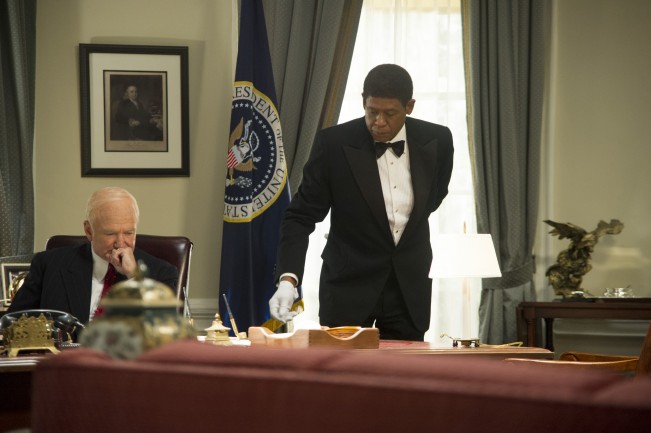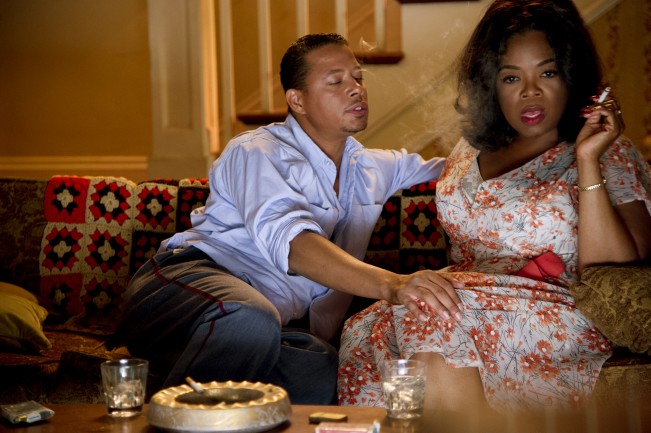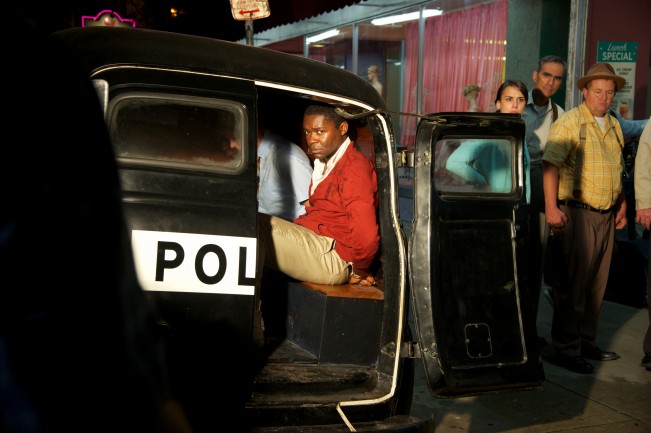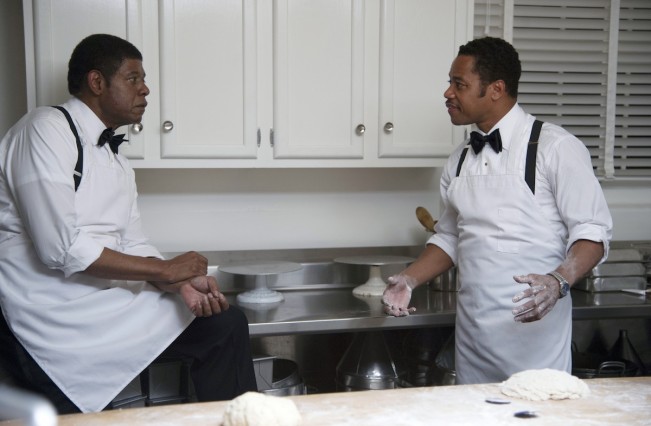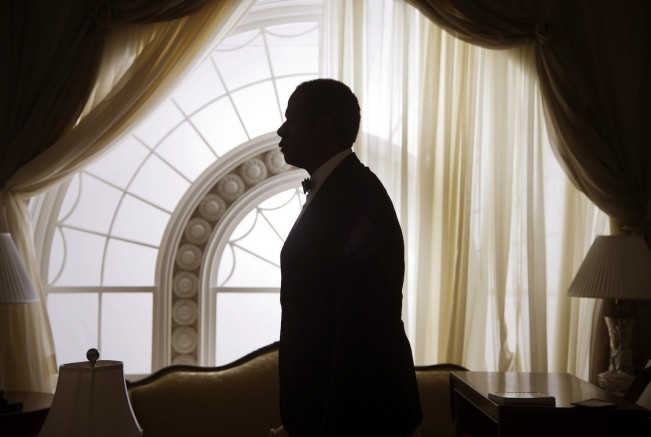

By Ray Pride Pride@moviecitynews.com
Interview: A Few Choice Details From Lee Daniels on THE BUTLER
Lee Daniels is almost as entertaining an interview subject as he is as a filmmaker. We first talked about Precious, and a few weeks ago about The Butler. We spoke at the Waldorf-Astoria Chicago on July 30, 2013. Earlier in the day, Forest Whitaker told me that Daniels’ attention had extended to a special detail on one of the film’s three posters: the butler’s upraised, Black Power-like salute still wears a white glove. We talk about details like that, Presidential cameos, father-son issues, his love for John Waters, the importance of dirty jokes in the movie, the racial slur that the butler hears throughout the film, the first alternate title that came to Daniels’ mind and more. (Plot details are discussed.)
The previous interviewer had told Daniels about having admired his bold, eccentric work all the way back to 2006’s Shadowboxer.
DANIELS: You put your heart, your soul, your guts, your everything into your films and sometimes it’s embraced, and sometimes it’s not embraced, and so… I remember that my directorial debut was not embraced. And for him to say that… Helen told me, Mirren told me, she said, Lee, people will appreciate this in many years, I promise. And I said, ooooo-kay, well… I’ll living in the now! (A big laugh.) I’m living now! Anyway.
PRIDE: The film very quickly announced itself as a Lee Daniels film. There’s no public profile of the film right now, what the film is [at the end of July]. Nobody’s talked about it, because almost no one has seen it. Some people are predicting it’s going to be docile. It’s going to be very uplifting. [Daniels cackles, then breaks out in huge laughter.] What is it, five or six shots in before you see the shot of the two lynched men hanging from a branch, the American flag behind them, no breeze, draped down dead weight, just like them? I was, okay, we’re in for the ride.
[Daniels nods, smiling.]
RP: Then at the end, one of my favorite touches, the very, very end, when the main credits come up, there’s “Directed by Lee Daniels.” “Written by Danny Strong.” And your MPAA-mandated title, Lee Daniels’ The Butler comes up, and it’s underlined in blue. [Daniels laughs.] Fuck you! It says with assurance. This is the title!
LD: I mean, what are they doing to me? What are they doing to me? Y’know, the last thing I want to see is “Lee Daniels’ The Butler.” Y’know, what are you doing to me? You’re drawing attention to, you’re trying to, you’re like… The MPAA, what are you doing? I don’t know, I have to look at it as a gift from the universe, I gotta not look at the negative. I tend to look at the negative, so I have to look at it as a gift from the universe. And just say, okay, let me go for this. Let me just go with this and let it just wash over me.
RP: That little blue underline…
LD: [grins] That was me.
RP: That was you?
LD: Of course!
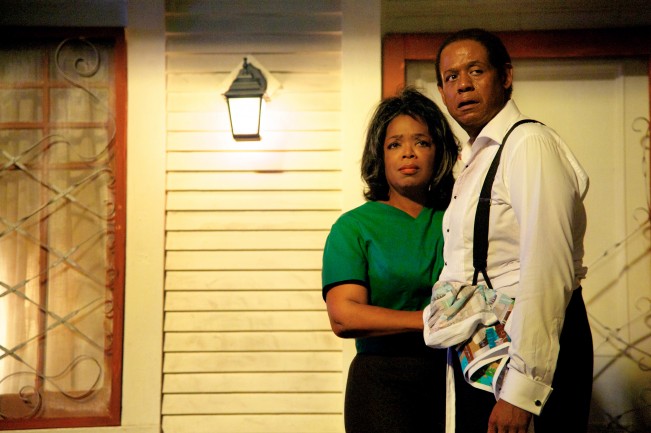
RP: There are details that pop in every kind of scene, even as you have several dramas and melodramas, going on at once, Oprah’s character has drama with her husband, has drama with next-door neighbor, she has that great speech, the lipstick speech. This late in a movie, and her character gets to commandeer the narrative? Other details. Jane Fonda playing Nancy Reagan. That’s a start. Then you give her that long walk down that carpeted hallway, moving away from the camera—
[Daniels’ laugh booms: HAHAHA!]
RP: And she does this sexy, sexual sashay.
LD: You’re too much. You’re funny. Thank you for catching all my wonderful nuances.
RP: I like how John Cusack’s Nixon plays with the makeup and the nose in profile so broadly. He and his New Crime Productions did commedia dell’arte prdouctions in the 1990s where masks with exaggerated features and exaggerated performance are part and parcel of the style. These tiny little details. He’s on screen for what, 90 seconds in the first scene, and it’s both cartooned and lived in.
LD: I can’t tell you how much I love him. He’s a, he’s a—oh man!—we are a Molotov cocktail together. And he is incredible, he pushes me, I push him. What he did to Cecil, Cecil—Forest is so into it, he’s so into the servant, he’s playing that guy. He’s standing there, “I have your martini, Mr. President,” and he’s waiting there and he’s waiting there and I’ve yelled action and it’s four minutes in, five minutes in, six minutes in, his hands are trembling. John refuses to call him over to the couch. It is the most sadistic! It transcends sadistic-ness! And he sits there, and finally, he grunts, hrrrrfffffmpf! I mean, it’s just like, what am I? And of course, I can’t put five minutes of that in a film. But to witness that. And I have that on tape, I’m going to put it in my director’s cut. Because it is a tour de force.
RP: It’s theatrical duration meets digital capture, something you never would have done if you were burning film.
LD: No! Yes.
RP: Tell me about all the scenes where you use such bold crosscutting. You intercut the setting of the places, the dinner service at the White House, with—
LD: The Woolworth’s lunch counter scene. Yeahhh… It was important. We didn’t write it like that, but it just sort of happens like that, where the word was, serving our country. To serving our country. Who was right? Was it Forest’s character? Or was it David’s character, the own? Who served the country best? Was Forest serving it by making the white man comfortable, by being subservient? Or was it David, who was out there fighting? I ponder that often, I don’t know the answer. What I do know is that… that we haven’t gone anywhere. I go overseas a lot, people, journalists ask, how is it possible you have an African-American president with all this, y’know, racial tension in America? And I can’t quite answer that.
RP: The Voting Rights passage, when LBJ is saying, we have to make this right for generations to come, is chilling. Today, after the Supreme Court decision, it’s almost like that never happened.
LD: Yeah.
RP: All these sorts of stirring words we should be hearing now.
LD: It’s terrifying. Anyway.
RP: My note for Robin Williams’ flicker of a cameo for Eisenhower was “unsettled calm.” He gives you so little and it’s just right even though, well, he doesn’t look like Eisenhower.
LD: Thank you.
RP: It’s almost like he’s going to go in the next room and give his farewell speech about the military-industrial complex.
LD: What’s fascinating, and even surprising, is these actors came to work on this film and they lost money, all of them. Because no studio wanted to do the movie they didn’t think it was important. But nobody wanted to do the movie. No studio thought it was worthy to be seen. What does that say? But the actors know. Actors know. And that’s my saving grace, because actors financed this film. It’s comforting.
RP: Did you worry about having the son so close to so many events? It’s fictionalized, but…
LD: No, because… No. There are many people that lived every one of those events. I think the only thing that was sort of a stretch for me was when he was [at an embassy protest, they’re chanting], “Free Mandela, free Mandela.” Because there, I have an uncle that marched with King, who then moved on to Malcolm X, then moved on to the Panthers. A lot of African Americans did just that, for the cause. So that didn’t but they didn’t run for Congress [as the son does], so that bit of it is a little… but most of the people who were the movement, started out peacefully, realized that didn’t do anything, then became more radical. And then more radical. A lot of them died. Unsung heroes.
RP: You let the film get complicated and unruly, historical dramas and domestic melodramas and reenactments and news footage, and as it moves on, besides Oprah’s story of the neglected wife, the movie becomes partially about the son, it’s a son-and-father film as much as a father-and-son film. The central focus is the butler with history happening in the White House while he stands to one side, but you’ve let it go in all these places and still get it in 131 minutes.
LD: I wanted it over two hours, but I guess I’m not allowed to.
RP: What cut did you feel good with?
LD: My director’s cut’ll be about two hours and forty minutes. All about family… And, and, and father and son dilemmas, father and son tension transcends race, we all have relationships with our fathers! That are fucked up. Or I do. And most of my friends do. So, I mean… we’re complicated.
RP: That vaudeville Oprah has in the last scene, where she looks at the picture, “That baby, she’s ugly.”
[Daniels laughs.]
RP: “She looks like you.” She thinks a second, “She’s not so ugly.” The character stays true all the way through, little side commentary keeps her sane.
LD: [laughing] Here’s the thing, man. Everything that I do is based on, if I don’t know it, if I haven’t lived it, if I can’t smell it or feel it? I don’t shoot it. It has to be completely, unequivocally, 100% true for me to, to shoot it. I can’t. Otherwise, it’s not the truth. People can poke holes at it, but you can’t poke holes at what I know to be true. You know what I mean?
RP: Behavioral truth.
LD: Behavioral truth, of course. I mean, certainly, I mean, the son is fictionalized. Cecil’s not fictionalized: JFK, Jackie gave him the tie, LBJ gave him the tie clip, Nancy invited him to the White House. Gloria was fictionalized, her alcoholism was sort of fictionalized, sort of took liberty with that. There was no second son. There was tension between the father and son, but yeah.
RP: There’s one phrase that takes on so many cruel meanings, but gets turned around and around, everyone uses it in a different cruel fashion, somebody’s always ready to call him the “house nigger.” It’s a cudgel for white and black alike, effectively saying, “I can hurt you with this.” You don’t let go of that.
LD: When we having the dispute over what the title was going to be, I said, “House Nigger.” Let’s fuck with them all! And just say “House Nigger”! Y’know? Oooh. That would get everybody talking. I don’t’ think you’d get anybody in the seats, though
RP: There’s a lot to Cecil’s character in that he observes, has to remain an observer, and yet others around him say, why don’t you act, and eventually his son says, you have to act. You have to be political. And Cecil says no, being political is doing all these things that years of tradition have taught me. But the cast of characters around him is like a whirligig of people going, no, to be non-political is a choice. If you don’t protest, you’re in tacit agreement, you’re part of the silent majority.
LD: Here’s the thing. I remember, I’m 53, so I remember my parents feeling a little nervous about Martin Luther King. They looked up to him, but they were a little nervous, he was causing something. And then they were terrified of Malcolm X. Absolutely terrified. Black Panthers came around? Forget about it. Completely forget about it! They were all heroes, in their own way, and I have kids. I have twins, and I know I could take a bullet for my, I could take a bullet for the kids, they are life and death and to me, but I don’t know if I could take a bullet for a cause. These kids were on the front line. And not just black kids, but white kids came. People think that this is like this black story [but also] it’s about the white kids that came in, because the black kids were too we had been told that we dare not go out. So white kids would come up, say, we’re coming with you. Who the fu—? Y’know. It’s a powerful time to write about. To talk about. It was a prod time to be an American, I think. Kids ain’t doing that shit today!
RP: What is John Waters’ joke, protesters today, hacktivists don’t have a look like in the 1960s, these aren’t true terrorists, they don’t know how to wear a beret.
LD: How much do I love him? Love. Live for him.
RP: He was very, very instrumental to who it is that I am. I remember going… I’m from Philadelphia, so I went to see his movie Pink Flamingos for the first time, and I was flabbergasted. I couldn’t believe that there was anything like that. So I took my mother and my 70-year-old aunt, her aunt, to see it the next day, because I couldn’t believe it. And I wish we had videotape then, they sat there, and I didn’t watch the movie. I’m watching the movie through like this and my mother said, what kind of sick shit is this? And she was really concerned about me. Terrified for me! She was really… And I got off on it! I got off on how she freaked over the movie. It was so incredible! I think there are nuances of John and nuances of Spike Lee in me.
RP: When you use the Cronkite footage, the familiar footage of him announcing JFK’s timte of death, he looks up to off-screen clock, he looks down, he looks up, and that’s all you use, that’s pretty confident use of the iconic. And you do that with flashes of the real events in black-and-white stills or photos several times. Martin Luther King on the balcony of the motel. Memphis. Alone. Calm. Not even calm before the storm. A man. A balcony. That’s all you need. Then the Malcolm X scene, two off-screen gunshots are what finally throw the two lovers into each others’ arms as they shelter in a gangway? History, lots of odd and quiet moments.
LD: You’re making me feel good about my movie, thank you.
RP: Images are compositions, but an image in a movie, it needs to have something suggestive, elusive, maybe something disruptive. There’s a word for you: disruptor.
LD: But I can only do me at the end of the day. I think that all the actors have seen the film and they’re just really happy, and I’m happy. Because what happens is that if they’re unhappy with their work and the film itself, that’s not so cool. Given that they work for free!
RP: What was the importance of getting a handful of dirty jokes in there? It’s mainly the guys in the White House service galley—
LD: Don’t. Don’t get me going about that. What version did you see?
RP: There was an announcement about an unfinished sound mix.
LD: The sound mix! It was cleaning up the, the smut! [laughs] I don’t know how to do a PG-13! Most times, my movies are NR, and I’m trying to get ’em to R! So this was like, I’m pounding my head up against the wall. Who doesn’t fucking curse? Who? It’s crazy. I get amped just thinking about it, you know what I mean?
RP: The version I saw had more than a PG-13’s worth of profanity.
LD: They’re so stupid. The thing is, that some of the jokes… the joke that really is the crudest, is Cuba’s joke, when he says, “How’d it go?” “I shit myself.” “I dated a girl once, every time I hit it, she shit herself.” The cook says, “Shut up,” and he says, “I put a towel down.” Hello! They didn’t get it? I was able to slip that by? That’s worse than any “fuck” in the movie!
RP: Lenny Bruce famously put down a heckler, middle-aged guy, loud sport coat, two blowzy women with him at his table, Lenny tells them they were like a Mormon wedding party, he’d like to join in, he’ll bring the clean towels. So on top of everything else this movie is, it’s got an oblique tribute to the late Mr. Bruce.
LD: Thank you so much, for dissecting all these things that I’ve worked so hard on. It’s wonderful to know someone notices a few of those.









